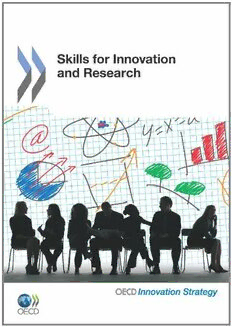Download Skills for Innovation and Research PDF Free - Full Version
Download Skills for Innovation and Research by OECD in PDF format completely FREE. No registration required, no payment needed. Get instant access to this valuable resource on PDFdrive.to!
About Skills for Innovation and Research
Innovation holds the key to ongoing improvements in living standards, as well as to solving pressing social challenges. Skilled people play a crucial role in innovation through the new knowledge they generate, how they adopt and develop existing ideas, and through their ability to learn new competencies and adapt to a changing environment. This book seeks to increase understanding of the links between skills and innovation. It explores the wide range of skills required, ranging from technical to ""soft"", and the ability to learn; it presents data and evidence on countries' stocks and flows of skills and the links between skill inputs and innovation outputs. Given the importance of meeting the demands of knowledge-based economic activity, the book investigates the issues of skill supply, education, workplace training and work organisation. It highlights the importance of enabling individuals to acquire appropriate skills and of optimising these at work. Table of Content : Executive summaryChapter 1. Skills and innovation Links, questions and challenges -The links between human capital and innovation-Policy questions and methodological challenges -Summary and approach Chapter 2. What are the skills needed for innovation? -Skills for innovation insights from the literature-Looking ahead -Summary Chapter 3. What the data and evidence say about skills and innovation -Skills and innovation at the country level-Skills and innovation at the industry level -Skills at work-SummaryChapter 4. Developing and using skills for innovation Policy issues -Supply of skills -Education and skills for innovation -Work organisation-Policy coherence -Summary
Detailed Information
| Author: | OECD |
|---|---|
| Publication Year: | 2011 |
| ISBN: | 9789264097490 |
| Pages: | 146 |
| Language: | English |
| File Size: | 1.42 |
| Format: | |
| Price: | FREE |
Safe & Secure Download - No registration required
Why Choose PDFdrive for Your Free Skills for Innovation and Research Download?
- 100% Free: No hidden fees or subscriptions required for one book every day.
- No Registration: Immediate access is available without creating accounts for one book every day.
- Safe and Secure: Clean downloads without malware or viruses
- Multiple Formats: PDF, MOBI, Mpub,... optimized for all devices
- Educational Resource: Supporting knowledge sharing and learning
Frequently Asked Questions
Is it really free to download Skills for Innovation and Research PDF?
Yes, on https://PDFdrive.to you can download Skills for Innovation and Research by OECD completely free. We don't require any payment, subscription, or registration to access this PDF file. For 3 books every day.
How can I read Skills for Innovation and Research on my mobile device?
After downloading Skills for Innovation and Research PDF, you can open it with any PDF reader app on your phone or tablet. We recommend using Adobe Acrobat Reader, Apple Books, or Google Play Books for the best reading experience.
Is this the full version of Skills for Innovation and Research?
Yes, this is the complete PDF version of Skills for Innovation and Research by OECD. You will be able to read the entire content as in the printed version without missing any pages.
Is it legal to download Skills for Innovation and Research PDF for free?
https://PDFdrive.to provides links to free educational resources available online. We do not store any files on our servers. Please be aware of copyright laws in your country before downloading.
The materials shared are intended for research, educational, and personal use in accordance with fair use principles.

